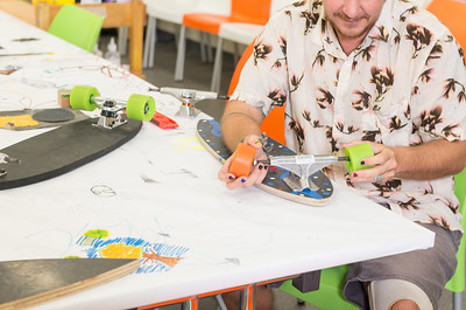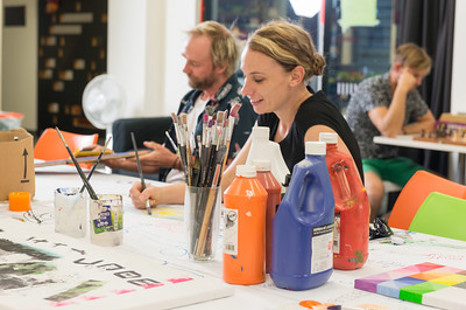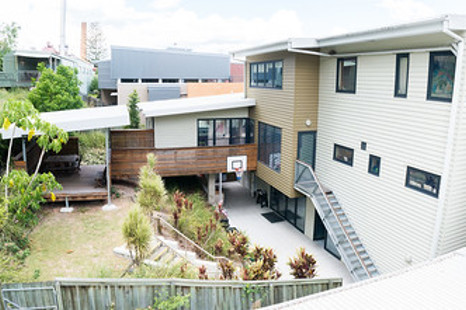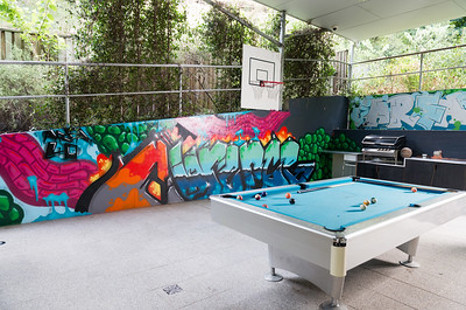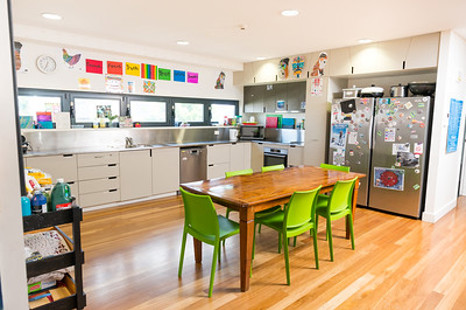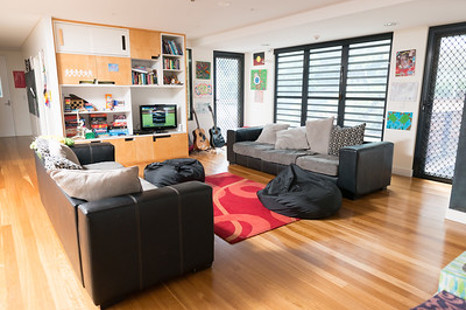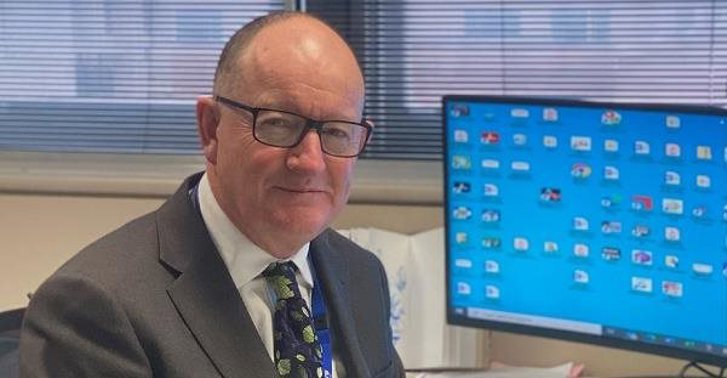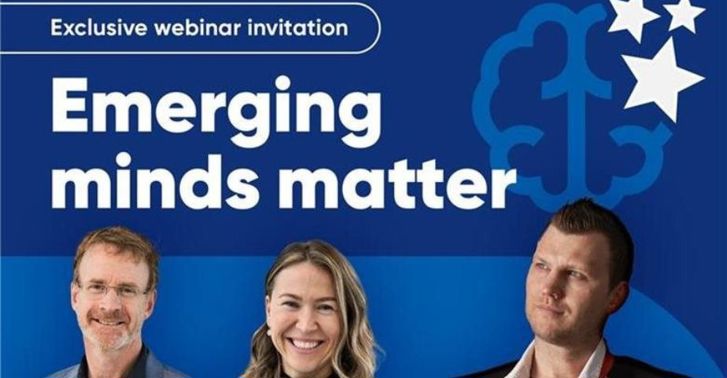
Supporting young people in their substance use recovery
Clarence Street is part of the Mater Young Adult Health Centre.
Located in South Brisbane, it is a free, confidential service supporting young people to make positive changes to their alcohol and other drug use.
Our diverse team are experienced in working with young people with substance use concerns. When we meet a young person, we do our best to match them with a team member whom they can build a connection with.
There are a number of voluntary support programs available for young people, as well as support for their families and carers.
Clarence Street aims to
- Support young people to complete their withdrawal in a safe, comfortable and youth-friendly environment.
- Deliver evidence-based alcohol and other drug interventions to help young people reduce the risks and harms associated with substance use.
- Tailor interventions to suit the individual needs of the young person. This includes careful consideration of the young person’s level of motivation, as well as their personal goals, strengths, and support needs.
- Support young people to connect with other agencies and community services that can provide ongoing support as needed.
- Work collaboratively with young people to create a tailor-made support plan that promotes their overall health and wellbeing.
- Provide comprehensive support to parents, families, carers and other people with whom the young person shares an important relationship.
Our programs
Accessing our programs
Clarence Street is a voluntary program. Getting in touch is easy. Young people can call directly to have a chat or find out more. We also welcome calls from families, as well as health and education professionals, community youth services, and other agencies.
If you are interested in finding out more about our service, please give us a call on 07 3163 8400 anytime between 8am and 4.30pm Monday to Friday.
The Clarence Street Day Program
Young people can attend the day program in our large and vibrant ‘Area 40’ space. The day program operates five days a week for young people aged 13-25 years, offering a range of activities to suit everyone. These include:
PIVOT
A vocational training program for young people to obtain skill sets and up to a Certificate II in Hospitality. Young people attending PIVOT are supported to learn at their own pace.
Job Club
A program supporting young people to build skills to prepare for work or further training (e.g. résumé writing, preparing for interviews).
FWD
A therapeutic group program supporting young people to enhance their motivation, build insight, and develop skills to cope with the emotional and interpersonal difficulties that often reinforce problematic substance use (by referral only).
Drop In
A safe place for young people to meet and participate in creative activities such as skateboard making, painting, screen printing, cooking, and playing music. Young people can attend Drop In every Wednesday, Thursday, and Friday. No appointment necessary.
Axis Community Team
Axis is a specialist youth work service providing individual support to young people who are concerned about their alcohol and other drug use. Appointments are hosted at Clarence Street or in the community within the greater Brisbane area. Young people are encouraged to nominate a meeting place that feels comfortable for them (e.g. cafe, shopping centre, school, or youth agency).
Axis offers young people an opportunity to develop an individualised treatment program tailored to their level of motivation and their specific goals related to alcohol and other drug use. For some young people, catch-ups might be aimed at reducing their use or getting more control over it. For others, it might be about learning to use more safely or stopping altogether.
A variety of therapeutic interventions and activities are available to suit each young person, including counselling, family work, and care planning and coordination with stakeholders.
If young people have health concerns related to their substance use, they can access a nurse or GP.
Adolescent Drug and Alcohol Withdrawal Service (ADAWS)
The Adolescent Drug and Alcohol Withdrawal Service has been operating since 2000. ADAWS is a residential program for young people who live in Queensland. It is available to young people aged 13 to 21 years (up until their 22nd birthday).
ADAWS is an 11 day ‘live in’ program supporting young people to safely withdraw from alcohol and other drugs. ADAWS provides a comprehensive program to enable young people to work towards their goals and achieve change in their lives.
The ADAWS program accommodates up to five young people at a time, providing individual rooms and 24-hour staff support.
Whilst at ADAWS, young people are supported by youth workers to participate in group work and recreational activities, including going to the gym. Groups include coping with cravings, alcohol and other drug awareness, and relapse prevention. During their stay, young people will also have access to mental health and general health checks.
After ADAWS
As young people transition back into the community, they often need ongoing support to manage the different challenges that arise. Young people within the greater Brisbane area are supported to connect with other services at Clarence Street (e.g. individual outreach support). Young people residing outside of the greater Brisbane area are supported to connect with other services closer to home.
Referrals to ADAWS
If you are interested in finding out more about the ADAWS program, please give us a call on 07 3163 8400 anytime between 8am and 4.30pm Monday to Friday.
Please note that involvement with our service is voluntary.
Clarence Street Extended Programs
In addition to the above services, Clarence Street recently opened the Thread and X-Tend programs for young people aged 13 to 17 years.
Thread offers an extended stay option for young people who have completed the residential withdrawal program and feel they would benefit from additional time in a therapeutic live-in environment. At Thread, residents have the opportunity to engage in ongoing relapse prevention work. Young people’s care plans are individualised and intervention planning is co-designed by young people in collaboration with key workers. Thread is a holistic program focusing on residents’ emotional, psychological, physical, and social wellbeing. Treatment may involve individual and group therapy, medical assessments, recreational activities, support with education and training, and life skills development. At Thread, young people participate in a 3-phase program, with young people invited to provide feedback and review their progress and goals at the end of each phase (10-week maximum stay). Throughout the program, young people are supported to build relationships with family and community (including other support services) to assist with their transition back into the community post Thread. At Thread, we pride ourselves on being youth and client-centred, honouring the expertise of young people who participate in our program.
The X-Tend program is an intensive outreach program for young people who have tried to access different types of Alcohol & Other Drug (AOD) support and found it difficult to gain traction in these traditional models. X-Tend may be helpful for young people who have a lot of other things going on in their lives in addition to their alcohol and other drug use. For example, it might be difficult to attend appointments due to transport issues or stressors at home. At X-Tend, young people have the opportunity to engage with their worker multiple times per week to allow for the development of a strong therapeutic alliance. X-Tend outreaches to the community across South East Queensland.
At Thread and X-Tend, support is provided to families and carers, with a view to growing family resilience and connectedness. This may involve education and/or skills training around areas such as understanding substance use, navigating boundaries, and enhancing communication skills.
Support for families and carers
We have family support counsellors available to families and significant others while young people are engaged in our programs at Clarence Street.
Click the button below to read more about our services for families and carers.
Information for community agencies
For more information, please call 07 3163 8400.
If you are interested in making a referral for a young person, please click below to download a copy of our referral form. Please note that if you are completing our referral form, consent must be obtained from the young person.
Need help outside hours?
For free, anonymous alcohol and other drug support 24 hours a day, 7 days a week, call the Alcohol and Drug Information Service (ADIS) on 1800 177 833.
In the case of an emergency, call 000.
Need help with other issues?
Clarence Street works collaboratively with other agencies such as schools, youth services, community organisations, and acute mental health services. If a young person needs help with something outside our scope of practice, we will do our best to connect them with other support services.
